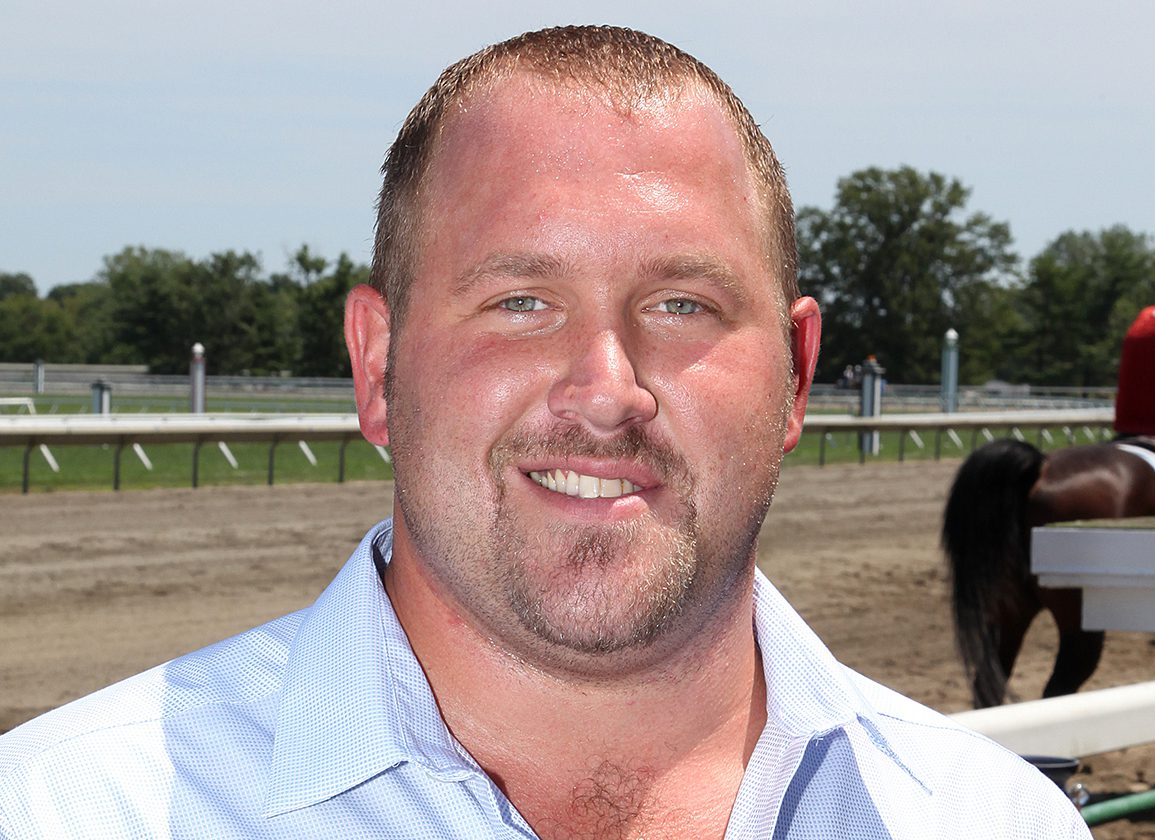By Bill Finley
On the surface, the case against trainer Jeffrey Englehart seems pretty cut and dried. He had a horse test positive for Clenbuterol, the bronchodilator that is on the Horseracing Integrity and Welfare Unit's (HIWU) list of banned substances. Trainers found using banned substances can be suspended for up to two years. But Englehart, who races at the NYRA tracks and at Finger Lakes, is adamant that he never gave the drug to the horse in question.
“We don't use Clenbuterol. Period,” Englehart said.
So is there more to this story? Dig a little deeper and you might conclude that there is. To Englehart, it's not about the fact that the horse tested positive. He doesn't dispute that finding. But when was the horse given Clenbuterol and by whom? He hopes the answers to those questions will clear his name and lead to HIWU dropping the case against him.
The horse that tested positive for Clenbuterol was an unnamed 2-year-old by Classic Empire out of Fast Heart. Englehart bought the horse on behalf of owner Marcello Rosa for $14,000 at the OBS auction June 15. The horse broke down while training and had to be euthanized at Finger Lakes Nov. 21.
Englehart's problems were just beginning.
HIWU performed a battery of tests on the deceased horse, including blood, urine and hair. The blood and urine tests were negative. According to Rick Arthur, former equine medical director for the California Horse Racing Board, a standard dose of Clenbuterol will typically be detectable in the blood for about three to four days after administration. For urine, the detection window would typically be between 10 to 17 days after administration.
But HIWU also performed a hair test, which revealed the presence of Clenbuterol. Englehart claims that hair tests can show the presence of the substance for up to a year after it was given to a horse. According to Arthur, Clenbuterol can be found in hair samples for at least six months after the drug was administered.
“We've certainly seen Clenbuterol in hair up to six months,” said Arthur. “It could probably stay longer, we just haven't tried to look at it. We did a lot of hair testing for Clenbuterol in Quarter Horses at Los Alamitos. Trainers have contended that horses past six months have tested positive.”
After learning about how long after administration Clenbuterol can be found in a hair sample, Englehart started to do the math. The horse broke down exactly five months and six days after the purchase at OBS. That means, Englehart contends, that it is entirely possible that someone gave the horse the drug before he purchased it and that he could be suspended for something someone else did.
“(HIWU) say it's in the horse's system, so you are guilty,” said Englehart, who is still training while awaiting he results of the split sample test done on the Classic Empire colt. “It doesn't matter to them that it can stay in the system for up to a year and I only had the horse for less than six months. That's completely unfair. They are trying to upend my life.”
The unraced colt was sold for $4,000 at the Fasig-Tipton Kentucky October Yearling Sale Oct. 26, 2022. The consignor was Vinery Sales and the purchaser was Juan Centeno. The latter, who sells under the name of All Dreams Equine, turned around and put the horse in OBS June. It was one of five horses who successfully went through the ring, including a horse named She She's Shadow (Bucchero), who was also purchased by Englehart.
When asked if She She's Shadow was tested and what the results were, Alexa Ravit, the director of communications & outreach for HIWU, said in an email response to the TDN: “HIWU cannot comment on what horses have been sampled or their subsequent test results beyond what is published on our website in accordance with the ADMC Program's public disclosure requirements.”
Englehart's theory is that Centeno gave the Clenbuterol to the horse in hopes that it would help the colt have a fast pre-sale workout. The horse put in a two-furlong breeze in :22.
“I don't know the gentleman from All Dreams Equine,” Englehart said. “I just know it had to be him because I know it wasn't me.”
Centeno did not respond to emails, text messages and phone calls from the TDN requesting a comment.
Englehart alleged that Clenbuterol use is “rampant” at the 2-year-old sales.
“This horse was probably training on (Clenbuterol) right up to day he sold,” Englehart said. “It's very well known that Clenbuterol use is rampant at sales. Every trainer knows that. I think if they did a hair test on every horse 70 to 80 percent would be positive for Clenbuterol.”
Under OBS's conditions of sale, no medication may be administered within 24 hours of a horse's under-tack performance. Several specific medications may not be administered on the sales grounds or present in a test sample, including Clenbuterol. OBS tests around 10-15% of the horses who are going to sell, but does not do hair-sample tests, just blood and urine. This colt was not one of those randomly tested in June, the sales company said.
When asked to elaborate on the sales company's rules regarding Clenbuterol, OBS President Tom Ventura said every step possible is taken to make sure that no horse in the sale has been given that particular drug.
“With our policy for bronchodilators, including Clenbuterol, we were ahead of the racing curve, because the sales companies have the ability within the conditions of sale to put policies in place maybe a little quicker than jumping through the regulatory hoops that are required at the racetracks,” Ventura said. “OBS, in October of 2019, prohibited bronchodilators. Period. In any animal at any level, in any type of sale.
“Since the very beginning of the tests, I think we had two early on who tested positive and didn't go through the ring, so two positives that we have had for Clenbuterol in four years. I know there weren't any in the last year. We test them as they're coming off the racetrack, and then the buyers have the right to test when they sign the sales ticket. We haven't had any returns for Clenbuterol from those tests.”
In limbo while awaiting the results of the split sample, Englehart has continued his own investigation. He believes the answer to his problems may lie in what is called a segmented drug test, which can provide a time line so far as when a drug was used.
According to the website cellmark.co.uk, by segmenting head hair samples into monthly one-centimeter sections, a month-by-month historic profile of drug use can be obtained. That goes for humans and horses.
If the segmented test shows that the Clenbuterol was administered prior to the day when Englehart bought the horse, it would seem to prove his point that someone else must have given the drug to the horse and lead, he believes, to him being exonerated.
Englehart has sent a hair sample off to the lab at Texas A&M and asked it to do a segmented test.
“I'm just hoping they look at the science and I don't have to do the suspension,” he said.
The problem is that he doesn't know if HIWU will also do a segmented test. Will they? Have they? HIWU won't say.
“HIWU cannot publicly comment on the specific facts of pending cases, including whether segmented analysis was conducted on samples taken from specific horses,” Ravit said in another email.
That's not reassuring to Englehart, who points out that the problem extends beyond sales. Horses often change hands, whether being bought at auction, being claimed or being privately purchased, and if they test positive for Clenbuterol through hair tests it would be unfair to automatically penalize the person who had the horse at the time it tested positive.
“The average horseman who bought a horse or has a horse in their possession for only a short period of time, they can't be dropping the hammer on them when something can still show up in these tests after a year,” Englehart said. “You have to know when the horse was given the Clenbuterol.”
We posed this question to HIWU: “Could a horse be given Clenbuterol by someone prior to being transferred to a new trainer and test positive? That would mean the current trainer would be getting penalized for something someone else did. Is this a plausible scenario?”
Ravit's response did not answer that question.
“HIWU cannot comment on the specific questions regarding Englehart's pending case, including the samples collected and type of testing conducted on Fast Heart 2021, the expected timeline to receive the B Sample results, and the plausibility of his defense,” she wrote. “Additionally, HIWU cannot speculate on the adjudication of the hypothetical case you described, for the outcome would depend on the specific facts of the case.”
Englehart is worried that he is running short on time. Once the results of split sample are in and as long as it also shows the presence of Clenbuterol, he will be facing what could be an immediate suspension that can last as long as two years.
“I'm just hoping that the tests comes back and vindicates me,” he said. “I will fight this as hard as you can and take this as far as necessary. I'm ready to take it to the courts. Meanwhile, this has been a nightmare for me.”
Dan Ross contributed to this story.
Not a subscriber? Click here to sign up for the daily PDF or alerts.









